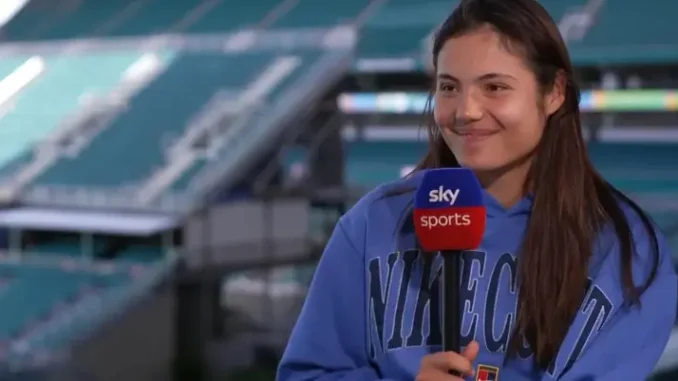
In the high-stakes world of professional tennis, where every serve and volley can make or break a career, Emma Raducanu stands out as a beacon of individuality and resilience. The 22-year-old British star, who skyrocketed to fame with her fairy-tale victory at the 2021 US Open, is once again turning heads—this time at the Miami Open in March 2025. What’s remarkable about her latest surge isn’t just her on-court prowess, but the unconventional path she’s forging without a full-time coach. Raducanu, a self-described “free spirit,” is proving that her unique approach to the game—unshackled by rigid structure—might just be the key to unlocking her best tennis yet.
Raducanu’s journey through the Miami Open has been nothing short of electrifying. She’s notched four consecutive wins, a feat she hasn’t accomplished in a single tournament since that unforgettable run in New York nearly four years ago. Her latest triumph came against American 17th seed Amanda Anisimova, a straight-sets victory that propelled her into her first-ever WTA 1,000 quarter-final. This string of successes marks a stark turnaround for the former Grand Slam champion, who had stumbled through a challenging season, losing five of her six matches since the Australian Open. Now ranked 60th in the world, Raducanu is rediscovering the fire that once made her a household name, and she’s doing it her way.
“I’d say I’m a bit of a free spirit so I don’t need restrictions or being told what to do,” Raducanu declared, her words dripping with the confidence of someone who trusts her instincts. “I think when I’m being really authentic, that’s when I’m playing my best.” That authenticity shone through in Miami, where she’s traded the conventional coaching playbook for a looser, more organic approach. Just days before her third-round match against McCartney Kessler, she was spotted playing spike ball with her team—a lighthearted ritual that she credits with keeping her relaxed. “Five minutes before the match I was playing spike ball with the team,” she shared with a grin. “It helps me to relax. When I’m playing my best tennis, I’m really expressing my personality.”
Her relaxed demeanor off the court belies the grit she’s shown on it. Against Kessler, Raducanu dropped her opening service game but roared back to win eight straight games, showcasing the aggressive, creative play that’s become her hallmark when she’s at her peak. Though the match ended prematurely when Kessler retired due to injury, Raducanu was quick to offer sportsmanship over celebration. “It’s never a way any athlete wants to win a match,” she said. “I wish McCartney a speedy recovery. She’s in such good form right now, playing so aggressive.” Earlier in the tournament, she’d already silenced doubters with a gutsy win over world number 10 Emma Navarro—her first hard-court victory against a top-10 opponent—proving her competitive spirit is alive and well.
That spirit, Raducanu admits, had been missing in recent months, even years. “The biggest thing I’m proud of is just finding the competitive spirit and being there for every ball,” she reflected after her Anisimova win. “I think that’s been missing in the last few months and even a few years at times.” The road to this resurgence hasn’t been smooth. A back injury derailed her pre-season, a traumatic stalking incident in Dubai rattled her mentally, and her coaching situation has been a revolving door of flux. Just last week, she parted ways with Slovakian coach Vladimir Platenik after a brief two-week trial, a decision that raised eyebrows but seems to have paid off. “I came here with someone and it didn’t work out, but we put in some great work,” she noted, hinting at the fluidity of her current setup.
Instead of a permanent coach, Raducanu has leaned on familiar faces like Mark Petchey, a British tennis veteran who guided her as a teenager and once coached Andy Murray. Petchey’s been offering pointers from her box alongside long-time ally Jane O’Donoghue and fitness trainer Yutaka Nakamura. “This week I have some really good people around me who I trust and who I have fun with off the court as well,” she explained. “That’s extremely important.” It’s a makeshift team that suits her freewheeling style, allowing her to play with a freedom and confidence rarely seen since her US Open heroics. “I feel when I am boxed into a regimented way then I am not able to express myself in the same way,” she told reporters, doubling down on her belief that less structure equals more success.
Raducanu’s coaching carousel—seven mentors in four years—has long been a talking point, with splits from the likes of Andrew Richardson, who led her to that US Open title, and Nick Cavaday, who stepped away in January due to health issues, fueling debate about her stability. Yet her Miami run suggests she might not need a single guiding voice. Examples of players thriving without a full-time coach are rare, but Raducanu’s drawing inspiration from the likes of Nick Kyrgios, who reached the 2022 Wimbledon final sans a permanent mentor. As she prepares to face US Open finalist Jessica Pegula in the quarter-finals, the tennis world is watching to see if this “free spirit” can sustain her magic—and perhaps redefine what it means to succeed at the elite level. For now, Raducanu’s thriving, one unscripted point at a time.
Leave a Reply